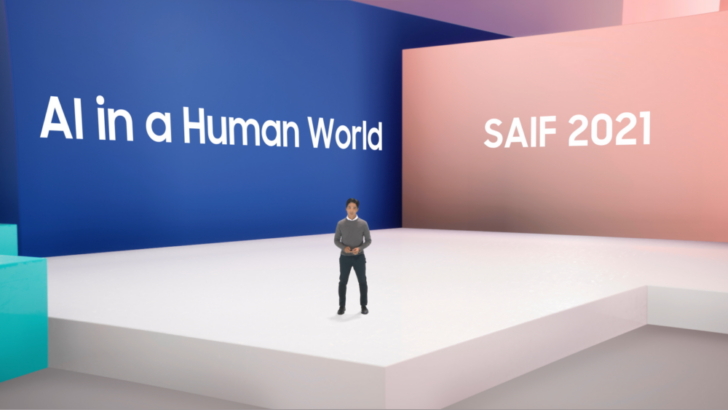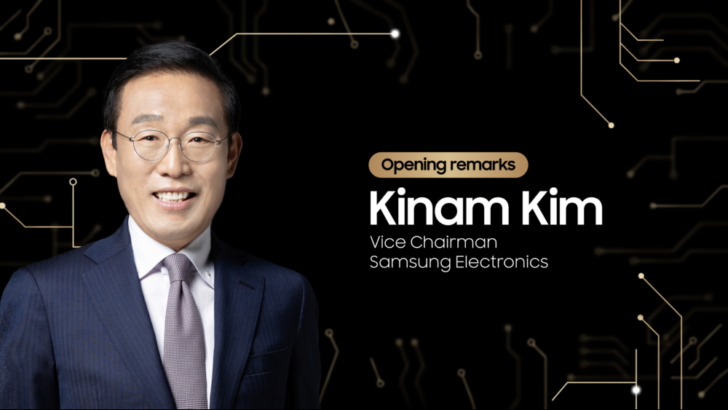Samsung Unveils Vision for the Future of AI at Samsung AI Forum 2022
on November 8, 2022
A host of world-renowned academics, researchers from Samsung Electronics and industry experts will come together to share their insights on the future of artificial intelligence at Samsung AI Forum 2022.
Now in its sixth year, Samsung AI Forum will be held from November 8 to 9 (KST). This is the first time in three years that the event will be held in person. With over 1,200 attendees expected to join, this global forum provides a packed program hosted by Samsung Advanced Institute of Technology (SAIT)1 on November 8 and Samsung Research2 on November 9.
The event will also be livestreamed on Samsung Electronics’ YouTube channel.
Day One: Shaping the Future with AI and Semiconductors

Under the theme of “Shaping the Future with AI and Semiconductor,” AI experts gathered to discuss the future direction of AI research that will create new milestones in AI-based semiconductor and material innovation.

The day started with opening remarks by Jong-Hee (JH) Han, Vice Chairman, CEO and Head of Device eXperience (DX) Division at Samsung Electronics. “I expect that AI technology will provide better convenience and new experiences for all while it also lays the foundation for other key innovations to various fields and applications, including next-generation semiconductors,” said Han.

Professor Yoshua Bengio of the University of Montreal, Canada, shared his latest research in a keynote presentation, “Why We Need Amortized, Causal and Bayesian World Models.” He emphasized the use of amortized inference and the Bayesian approach in causal models for AI that explores theories and design experiments in the field of science and general AI.
Afterward, technology sessions, such as “AI for R&D Innovation,” “Recent Advances of AI Algorithms” and “Large Scale Computing for AI and HPC” were delivered.
In the “AI for R&D Innovation” session, research leaders at SAIT, including the Executive Vice President and Head of SAIT’s AI Research Center, Changkyu Choi, shared the status and vision of Samsung’s research on AI. Specifically, they discussed how AI technology will be influential in fields including semiconductors and material development.
In a session named “Recent Advances of AI Algorithms,” Minjoon Seo, a professor at KAIST, and Hyunoh Song, a professor at Seoul National University, delivered presentations on the latest research achievements on AI algorithms, including large language model-based interface for ultra-accurate semantic search.
Lastly, in a session called “Large Scale Computing for AI and HPC,” leading researchers on supercomputers, including the former IBM and Intel Fellow, Alan Gara, discussed the role of AI in the future of high-performance computing. They also introduced an insightful case on processing-in-memory, an innovative technology that is enabled by the development of next-generation supercomputers.
Samsung AI Researcher of the Year awards, which were established to discover excelling rising researchers in the field of AI, were also presented during the forum. Samsung AI Researcher of the Year was awarded to five AI researchers, including Professor Mohit Iyyer at the University of Massachusetts Amherst.
In addition, various programs, including poster presentations of excellent research papers, an introduction of SAIT, an exhibition of its research projects and networking event for researchers and students in the field of AI, were held to accelerate active research in AI.

Day Two: Scaling AI for the Real World
Under the theme of “Scaling AI for the Real World,” Day 2 of the forum hosted by Samsung Research will be a venue for sharing the development direction of future AI technologies that will significantly affect our lives, including hyperscale AI, digital human, robotics, etc., that have become hot topics.
Sebastian Seung, President and Head of Samsung Research, will give a keynote on the “first steps of an effort to improve upon classical brain theories by optimizing biologically plausible unsupervised learning algorithms” together with a welcoming remark.
Following a presentation on the “Current Status of AI Research by Samsung Research” given by Daniel D. Lee, Executive Vice President and Head of Global AI Center at Samsung Research, AI experts, including the heads of global research centers who have recently conducted active research will be invited to the stage as speakers.
Professor Terrence Sejnowski at the University of California San Diego, U.S., who found NeurIPS, the world’s most prestigious AI conference, will discuss the intelligence of hyperscale language models based on experimental cases testing whether hyperscale language models have intelligence.
This will be followed by an introduction of the next-generation AI research direction for ensuring the responsible and fair use of hyperscale AI in the products and services of businesses presented by Dr. Johannes Gehrke, Head of Microsoft Research Lab.
Next, Professor Dieter Fox at the University of Washington, U.S., who is also the Senior Director of Robotics Research at NVIDIA, will explain how a robot can directly operate unlearned objects only based on visual data without creating 3D models. He will also discuss how to use natural language commands to effectively instruct a robot to carry out various operations.
Lastly, Seungwon Hwang, a professor at Seoul National University, will discuss ways to use causality, evidentiality, and other forms of knowledge to further strengthen hyperscale language models.
There will be two live panel discussions moderated by EVP Daniel Lee, one in the morning and the other in the afternoon, in which panelists will discuss various topics. There will also be Lightning Talk sessions in which researchers at the Global AI Center will give presentations on the details of their current research.
In the Lightning Talks session, Vice President Joohyung Lee at Global AI Center will discuss ways to use hyperscale AI models to combine the external appearance of a digital human with internal intelligence. SangHa Kim will also explain a machine translation technology that allows users to use various Samsung products with no language barrier.
In addition, participants will have opportunities to look at several demos and research posters produced by Global AI Center at the booth, where they can personally interact with the researchers.
Furthermore, on the forum’s website, speakers and participants can freely communicate in Korean and English on the Q&A Bulletin Board, where Samsung Research’s translation service “SR Translate” is applied.
1 Samsung’s R&D hub dedicated to cutting-edge future technologies.
2 Samsung Research, acting as Samsung Electronics’ advanced R&D hub, leads the development of future technologies for the company’s Device eXperience (DX) Division.




